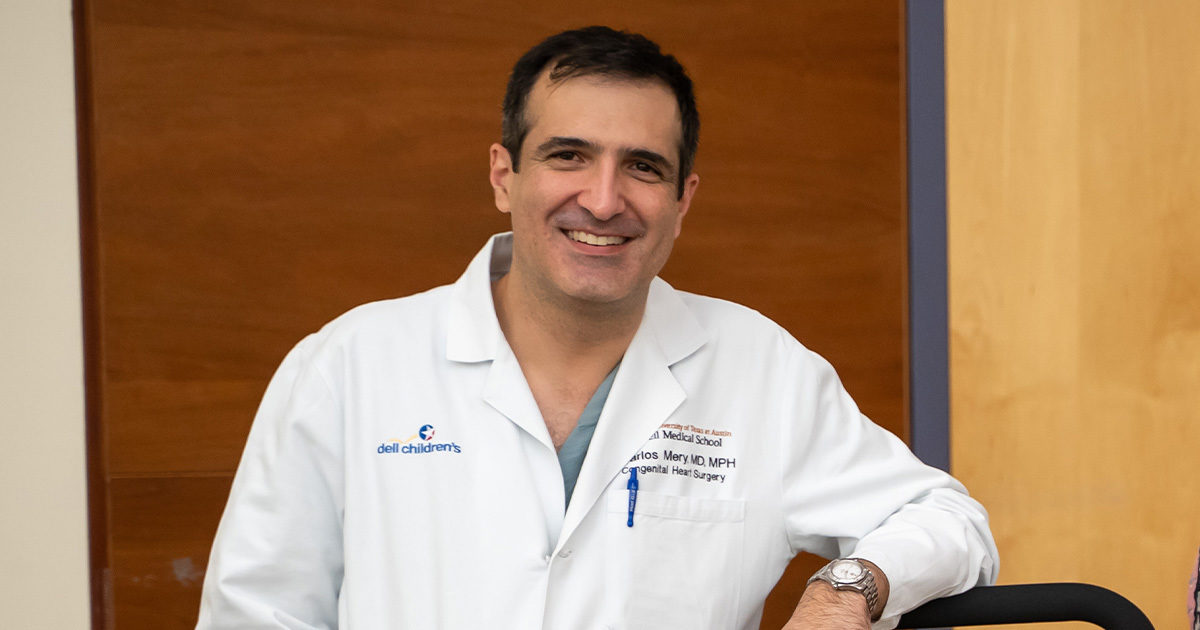UT Health Austin and Dell Children’s Medical Center Are Awarded Funding to Study Rare Coronary Artery Anomalies in Young People
Anomalous aortic origin of a coronary artery (AAOCA) is the second leading cause of sudden cardiac death in young people
Reviewed by: Carlos Mery, MD, MPH
Written by: Lauryn Feil

UT Health Austin and Dell Children’s Medical Center are proud to announce funding for a multi-institutional study to focus on patients with anomalous aortic origin of a coronary artery (AAOCA) and their families. AAOCA is a congenital heart defect in which one of the arteries that bring blood to the heart muscle is not attached to the larger artery in the normal position. This condition is the second leading cause of sudden death in children and young adults who participate in sports; however, AAOCA can be corrected with surgery.
The Coronary Anomalies Research and Engagement (CARE) collaborative is a group of investigators from Dell Children’s, UT Health Austin, the Value Institute for Health and Care, Boston Children’s Hospital, Children’s Hospital of Philadelphia, and Texas Children’s Hospital as well as parents of patients with AAOCA. The collaborative has been approved for a funding award through the Eugene Washington PCORI Engagement Awards program, an initiative of the Patient-Centered Outcomes Research Institute (PCORI). The funds will support the engagement of patients with AAOCA and their families to develop a patient-centered outcomes research agenda.
This project will focus on engaging with AAOCA patients and their families to identify key gaps in care and meaningful patient-centered outcomes through qualitative research methods and online surveys while also establishing a stakeholder network to stimulate research in this field. The project aims to connect with a diverse range of AAOCA patients and their families across the United States to identify and prioritize their most critical research questions about AAOCA.
“From a parent’s perspective, discovering your child has AAOCA is shocking and stressful. Everyday life and the management of things that were once normal, like sports and exercise, now create an immense amount of fear and anxiety. And because there is currently not a clear roadmap for treatment, parents must make life and death decisions and assess lifestyle risks the best they can for their individual child. That’s why studies that can capture patient-centered outcomes research and create a network for those with AAOCA are so vitally important,” reports CARE Collaborative Patient Parent Partners.
Carlos Mery, MD, MPH, UT Health Austin congenital heart surgeon and Surgical Director of the Coronary Anomalies Program within the Texas Center for Pediatric and Congenital Heart Disease, a clinical partnership between UT Health Austin and Dell Children’s Medical Center, will lead the project in collaboration with the Value Institute for Health and Care at The University of Texas at Austin Dell Medical School and McCombs School of Business.
Co-investigators at The University of Texas at Austin include Keren Hasbani, MD, and Alexandra Lamari-Fisher, PhD, from UT Health Austin and Dell Children’s, Kathy Carberry and Chris Ulack from the Value Institute for Health and Care, and Kate Taylor and Liz McCullum from the Health Transformation and Design Program in Congenital Heart Disease. Meena Nathan, MD, will be the site Principal Investigator (PI) at Boston Children’s Hospital, Julie Brothers, MD, will be the site PI at Children’s Hospital of Philadelphia, and Silvana Molossi, MD, will be the site PI at Texas Children’s Hospital.
PCORI is an independent, nonprofit organization authorized by Congress in 2010 to fund comparative effectiveness research that will provide patients, their caregivers, and clinicians with the evidence needed to make better-informed health and healthcare decisions. PCORI is committed to seeking input from a broad range of stakeholders to guide its work.
To learn more about the the Coronary Anomalies Program within the Texas Center for Pediatric and Congenital Heart Disease, visit here.